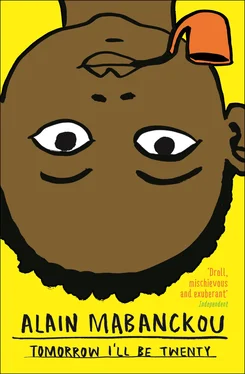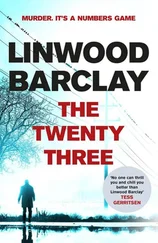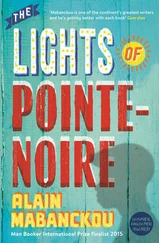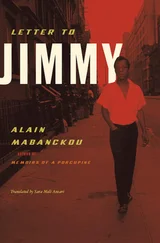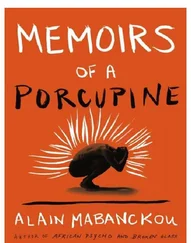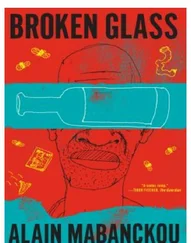I have to do it like Papa Roger. I open the briefcase carefully and take out the tape recorder. I press a button, the little window opens. I pick up the only cassette we have and put it in the little window, then I close it, still being very careful. I press ‘Play’ and the singer with the moustache starts singing.
So there we are, listening to Georges Brassens and looking at his photo on the cassette box. Each time, Lounès tells me to be quiet, and replay the song once it gets to the end. On the cassette player there’s a button with an arrow pointing left. On the button it says ‘RWD’, that’s where you press to go back to the beginning of the song. I saw Papa Roger doing that before. I don’t like arithmetic much, but by my reckoning I’ve pressed this button at least ten times to get back to the start of the song.
We’ve stopped talking, we’re just listening now. We’re beginning to know the words, but from time to time I have to ask Lounès what some of the difficult words mean. He knows more words than me because he’s in fifth grade at secondary school. For example, I don’t understand it right at the beginning of the song when the singer with the moustache says:
I left my old oak
My saligaud
My friend the oak
My alter ego
What’s a saligaud ? I don’t know. Lounès doesn’t know. We give up, it doesn’t matter.
But then, what’s alter ego ? We won’t want to give up on that one, alter ego may be what the song’s actually about.
‘“ Alter ego ”’s not French,’ says Lounès.
‘What language is it then, if it’s not French?’
‘It must be a kind of dialect, of some European tribe.’
‘A tribe?’
‘Yeah, some really small European tribe that still speaks real French, because that’s where French started.’
That’s what he says, but I can tell he’s not sure. It can’t be that, and we go on trying to work it out, and Lounès tells me that alter ego means someone really egotistical, like Monsieur Loubaki, who owns a bar called Relax, and makes the clients pay up the same day as they drink, whereas in the other bars you only pay at the end of the month.
‘Yeah, Monsieur Loubaki, he’s alter ego !’
I say the singer with the moustache can’t be saying the tree is his alter ego , his selfish person. Because why would you be weeping for a selfish person and missing him? You wouldn’t, you’d be being rude to him, the way people are to Loubaki in his bar.
Lounès promises to ask his teacher at school, I mustn’t ask mine, because if by any chance he doesn’t know what alter ego and saligaud mean I’ll get into trouble. The teacher will be embarrassed in front of the pupils and think I’m trying to make fun of him, and whip me with a bicycle chain. At Trois-Glorieuses they don’t hit the pupils, they’re too big, some as big as the teachers, sometimes a lot bigger. So Lounès is safe.
I don’t know why, I feel like going up to Loubaki and saying ‘saligaud’ and calling Lounès my ‘alter ego’. A little voice in my head says that saligaud is bad, and alter ego is ok. Better to be an alter ego than a saligaud . I’m quite sure the singer with the moustache wishes his tree, his alter ego , all the very best, and that’s why he weeps for it, the whole day long.
In the evenings Papa Roger tunes in to Voice of America, a radio station that broadcasts the news in French, from America. I do wonder how the news makes it as far as a little country like ours and why our President doesn’t interrupt the signal because they do put out a lot of serious stuff on that station, stuff Radio Congo can’t say, or there’d be no more radio in our country.
My father only listens to Radio Congo to hear the death notices for the towns and villages in our country. They never say why these people have died, they say ‘after a long illness’, like when Monsieur Moundzika died and Maman Pauline went to the wake for two days. What are these long illnesses that they can’t explain over the radio? Another thing, they always say they ‘regret’ to announce the death of so and so. Papa Roger says a lot of people ‘regretting’ the death of these people are actually in a hurry for them to depart this life, so they can go and take over the land and animals they’ve left behind: ‘Never trust anyone who makes an announcement on the radio, in the end they’re the ones who drive the widow and her children from the home of the deceased and seize their inheritance.’
When it’s time for the announcements to come on, they play this sad music first of all, then the person reading them out puts on this sad voice as though the deaths he’s about to announce had occurred in his own family. I go to my room because I don’t like that music, and I hate the voice of the announcer. I know she’s pretending to be upset, that she gets paid to be sad. It’s just then that Maman Pauline sits up attentively. She asks us to turn the sound up, brings her chair up to the table and practically glues her right ear to the radio. And if she hears the names of the villages in the Bousenza region, like Moussanda, Nounga, Ntséké-Pemb Batalébé, Kimandou or Kiniangui, she turns round and says to us: ‘I know the people who’ve just lost their relative. They live near the river Moukoukoulou, behind where the Kibonzi family plant their crops.’
And she cries, as though it was our relative who had just died.
There’s a journalist on Voice of America that Papa Roger really likes, his name is Roger Guy Folly. During meals that’s all he ever talks about now. Is it because the journalist in question has the same name as him, Roger? When my father says his name you’d think he was talking about his own brother: Roger Guy Folly this, Roger Guy Folly that.
It’s this American who tells us the time every evening:
It’s twenty-one hundred hours, universal time, and you’re listening to Voice of America. Coming straight up, the evening news from Washington, with your faithful servant, Roger Guy Folly.
Now, when Roger Guy Folly says ‘twenty-one hundred hours’ and I look at the alarm-clock on our dresser, I can see it’s not the same time in our country. So, when it’s night here, in other countries it’s still bright daylight, with children out playing. When we’re up and about here, in other places people are sleeping, and when we’re sleeping here, people elsewhere are up. It’s pretty weird.
Papa Roger always agrees with what Roger Guy Folly says. Sometimes he shouts, turns to us, tells us to be quiet, and promises he’ll explain what’s being said in a few minutes because Maman Pauline gets sick of listening to things she doesn’t understand and countries she’s never heard of before. Papa Roger writes down the names of the people, towns and countries on a piece of paper for me.
For example, this evening Roger Guy Folly is telling us about a town called Phnom Penh, the capital of Cambodia. Phnom Penh is too complicated to pronounce. It’s complicated to write down too, but once you’ve done it, it’s as easy as swallowing. Otherwise how would the Cambodians manage to write it and say it every time, when they’re only human, like us?
Maman Pauline can’t say ‘Phnom Penh’.
Papa Roger says: ‘Pauline, it’s very simple. To say Phnom Penh you make your mouth really small, you breathe out through a little hole, like when you’re whistling, then you suddenly open you mouth wide, like when you’re surprised by something really bad that’s happened, which it usually has in Cambodia!’
Roger Guy Folly tells us that the Vietnamese army has just taken the town of Phnom Penh and driven out the wicked people called the Khmer Rouge even though they are Cambodian too. The wicked people were treating their own people very badly, though they’re communist like we are. So the Vietnamese — their country is just next to Cambodia — said: Since these Khmer Rouge are threatening our borders, let’s get on over to Cambodia and take Phnom Penh out of the hands of the Khmer Rouge, that will give the Cambodian people a bit of a break after all that torturing, killing and liquidating by the Khmer Rouge. When the Cambodians went into Phnom Penh there was practically no one left in the city because of the Khmer Rouge, who’d driven everyone out. The Khmer Rouge had been really looking for a fight for ages. They pushed their Vietnamese neighbours over the edge, after years and years of fighting, like most countries with a common border. And then what happens is, one country says: This is my territory, the territory of my ancestors, I want to get it back, by fair means or foul. The other country says: Oh no, it’s not your territory, it’s mine, and I won’t let you take it back by fair means or foul. I’m going to protect it by fair means or foul. And they start fighting by fair means or foul for years on end. That’s why when the Vietnamese went into Cambodia, the Cambodians were frightened to begin with and said to themselves: What are these Vietnamese guys going to do to us? Have they come to take our country from us by fair means or foul? As soon as the Cambodians realised that the Vietnamese were actually after the Khmer Rouge, many of them helped the Vietnamese army, because they’d had enough of being tortured, killed and liquidated. The government of the Khmer Rouge fled, and went to hide in the bush. Their boss is called Pol Pot and he’s so wicked he wiped out over a million and a half people, then fled when the Vietnamese invaded his country.
Читать дальше
